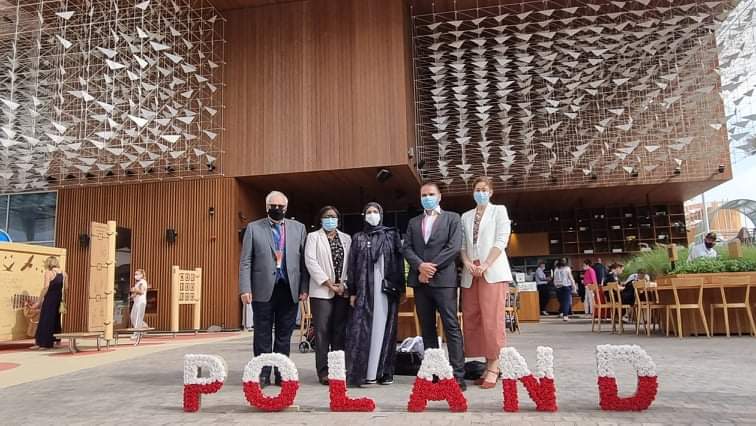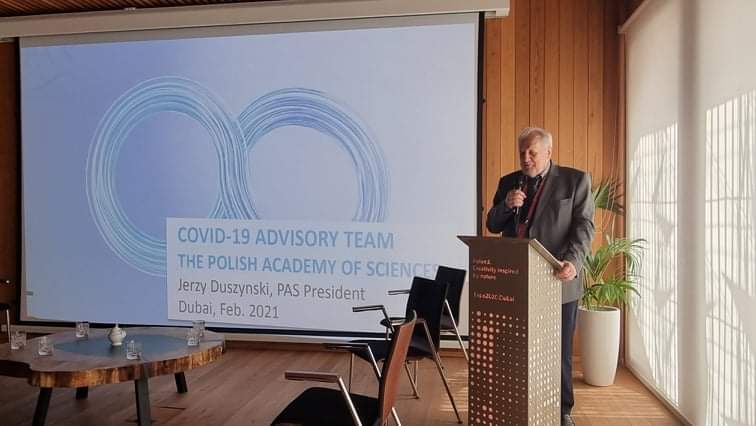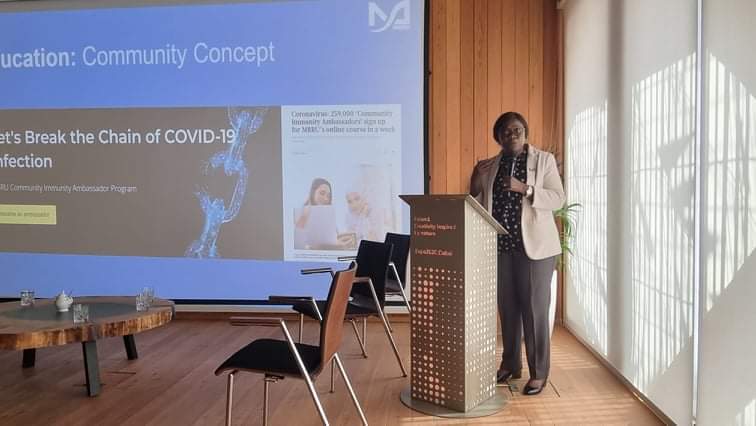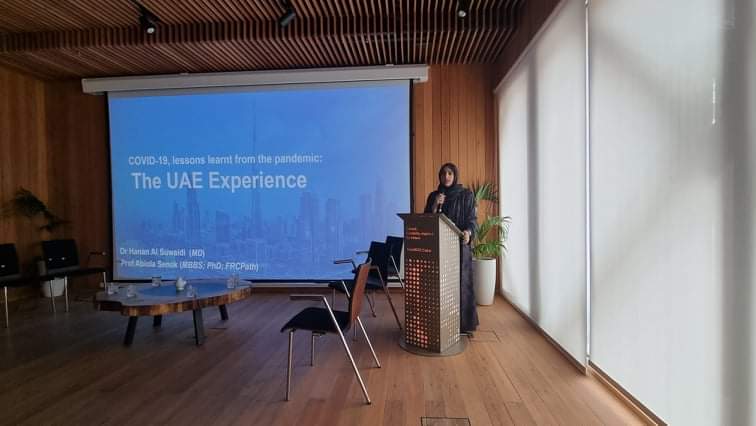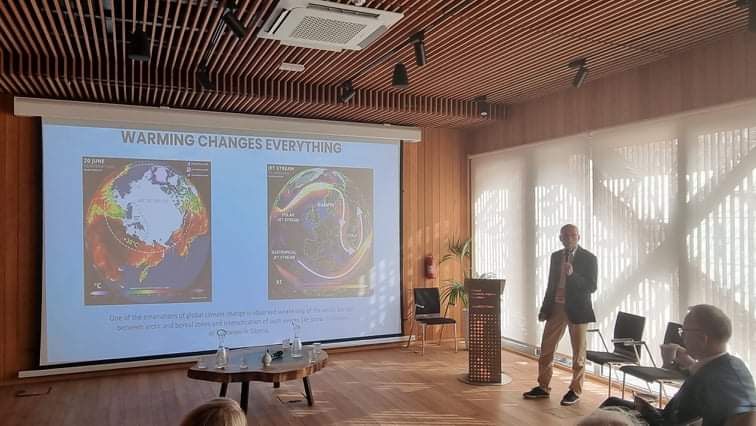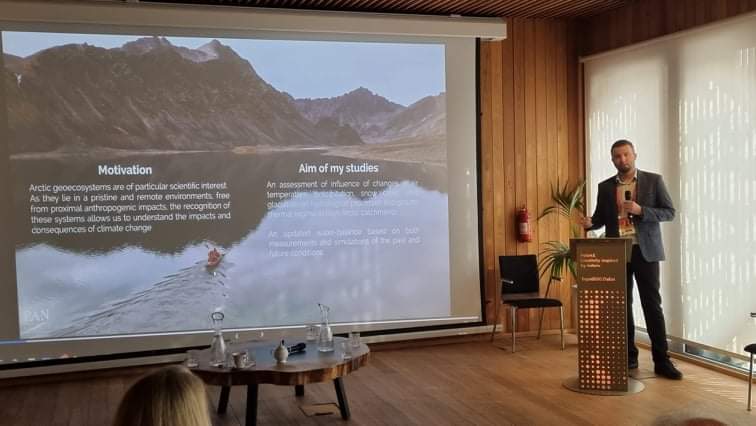Polish Science Week at EXPO in Dubai with the Polish Academy of Sciences
During our presentations in Dubai you will meet top experts experienced in fight with the Covid-19 pandemic and scientists specialized in polar research.
COVID-19 – LESSONS LEARNED FROM THE PANDEMIC
Meeting at Expo 2020 is a unique opportunity to share experiences from the global fight with COVID-19. We are truly greatful to our friends from MBRU for joining us to talk about lessons learned from the pandemic.

Prof. Jerzy Duszyński a biochemist, Member of the Polish Academy of Sciences (PAS), and President of the Academy since 2015. Affiliated since 1971 with the Nencki Institute of Experimental Biology, where he served as a Director in 2003-08. His research work deals with bioenergy, the role of the mitochondria in cell function, mitochondrial and neurodegenerative diseases, and aging. In 2008-09 he served as Deputy Minister of Science and Higher Education, responsible for science. He is a chairman of the PAN Advisory Group on COVID-19.
Prof. Krzysztof Pyrć a virologist and biologist. A graduate of the Jagiellonian University in Kraków and the University of Amsterdam. Leader of the Virogenetics team at the Małopolska Center of Biotechnology (Jagiellonian University), head of the Laboratory of Virology and Infectious Animal Facility at the Jagiellonian University. He studies the biology of infection and pathogenesis of coronaviruses and flaviviruses, developing new antiviral drugs, and creating and validating new diagnostic methods. He is a deputy chairman of the PAN Advisory Group on COVID-19.
Prof. Abiola Senok professor of Microbiology and Infectious Diseases, Chair of Basic Sciences, College of Medicine MBRU: Professor Senok is a Fellow of the Royal College of Pathologists, United Kingdom. Her research has focused on the molecular epidemiology and determinants of the dissemination of multidrug-resistant organisms. She is on the Expert Panel of Infectious Disease Hub (UK), the UAE National Sub-Committee for Antimicrobial Resistance Surveillance and the Central Antibiotic Stewardship Committee, Dubai Health Authority. In the pandemic response, she served on the National COVID-19 Research committee and is a core member of the COVID-19 Committee of Abu Dhabi. She is also a member of the Mohammed Bin Rashid Academy of Scientists and is the General Secretary of the Emirates Society for Clinical Microbiology.
Dr. Hanan Al Suwaidi assistant Professor of Family Medicine and Director, Governance Office at the College of Medicine MBRU: Dr Al Suwaidi is certified by the Arab Board and is a member of the Royal College of General Practitioners. She was the UAE’s 1st Flight Surgeon to support the UAE’s inaugural mission to the International Space Station. She is highly experienced in clinical practice, healthcare administration, and health policy and regulation in the public and private sectors. Dr. Al Suwaidi was instrumental in several strategic and operational initiatives for healthcare funding including the design and implementation of the first national government-based health insurance scheme in Dubai (SAADA). In 2020, she was assigned as the lead for the testing stream at the COVID-19 Command and Control Centre, overseeing the COVID-19 testing efforts in Dubai. Since 2021 she has been leading the vaccination roll out plan for the emirate of Dubai.
Dr. Anna Plater-Zyberk head of International Relations of the Polish Academy of Sciences since 2017. A cognitive linguist and anthropologist by training, an expert in the field of international cooperation in science. She carried her research at the Metaphor Lab in Amsterdam and completed a doctorate on the topic of conceptual metaphor theory at the Jagiellonian University. She is a secretary of the PAN Advisory Group on COVID-19.
POLAR RESEARCH IN THE ERA OF CLIMATE CRISIS
Polar bears, penguins and Poles at the Poles. Polar researchers talked about Arctic and the Antarctic and the impacts of climate change on its biodiversity.

Prof. Paweł Rowiński is a Professor in Earth Sciences, granted in 2009 by the President of Poland, and the Corresponding Member of the Polish Academy of Sciences. In May 2015, he was elected as the Vice President of the Polish Academy of Sciences (in January 2019 he has started his second term). From 2008 to May 2015, he was the CEO of the Institute of Geophysics, Polish Academy of Sciences. During 2004–2008, he was the Research Director of that Institute. He was also the Co-Founder of the Earth and Planetary Research Centre (GeoPlanet). During 2009–2015, he served as the first Chairman of the Board of Directors of the GeoPlanet. Later he was the initiator of joining GEO8 – European Earth Sciences Research Alliance by the GeoPlanet Center. In 2018 he was elected as the Vice Chair of the International Association for Hydro-Environment Engineering and Research IAHR Europe Division Leadership Team. In addition in 2018 he was elected a member of Board of ALLEA - the European Federation of Academies of Sciences and Humanities.
Dr. Tomasz Kijewski biologist and educator. I work in team “CORE” Climate and Ocean Research and Education unit at Institute of Oceanology Polish Academy of Sciences. For dozen years I worked in the laboratory of genetics of marine organisms and it was a great scientific adventure - participation in discovering the basis of biodiversity. The second great adventure was Arctic research cruise in the Norwegian Sea. I've always been fascinated by biology, and at some point I realized that sharing knowledge, educating people is my path. So I try to share my admiration for the complexity and threats to marine ecosystems in scientific festivals, lectures and workshops in schools and for general public. Only common understanding and appreciation can lead to concern for the environment and the future.
Dr. Małgorzata Korczak-Abshire Polish biologist, who has been actively involved in the research of polar ecosystems since 2005. She uses remote sensing and telemetry, as well as other innovative technologies, in the study of Antarctic fauna species. Member of five expeditions to Polish Antarctic station H. Arctowski, situated on King George Island, South Shetlands, Western Antarctic. In 2013-2017, Polish representative in the International Scientific Committee for the Conservation of Antarctic Marine Living Resources. As a member of the Committee, she aims at supporting activities for the protection of the Southern Ocean ecosystem.
Dr. Tomasz Wawrzyniak assistant professor (adiunct) at the Department of Polar and Marine Research, Institute of Geophysics Polish Academy of Sciences in Warsaw, Poland. PhD in Earth Sciences, coordinator of hydro-meteorological monitoring conducted at the Polish Polar Station Hornsund in Svalbard. Author of scientific papers and books on the impact of climate change in the Arctic, hydrological processes, and their modelling.
Dr. Agata Goździk geophysicist, educator and science communicator, the head of the Science Communication and Education Department in the Institute of Geophysics Polish Academy of Sciences. She coordinated several big educational initiatives both at national and European level: EDU-ARCTIC, ERIS, ODYSSEY, BRITEC, EDU-ARCTIC2. She also worked as deputy director of the Department of Environmental Education in the Polish Ministry of Environment and as Director of the Science Promotion and Dissemination Department in the Polish Academy of Sciences. She is a member of the Climate Crisis Advisory Team to the Chairman of the Polish Academy of Sciences.
M.Sc. Krzysztof Otto polar and technical Director at the Institute of Geophysics of the Polish Academy of Sciences. He was: Polish representative of the preparatory phase of the European project "EPOS", Polish coordinator of the European project "EU PolarNET" and Project Manager - "Selection of the location for the Radioactive Waste Repository". Currently, he is involved in such projects as: Project coordinator - "Selection of the location for the construction of a nuclear power plant in Poland" and Project coordinator - "Monitoring of Poland's seismic hazard". As part of his duties is supervise the organization and operation of the “Polish Polar Station Hornsund” in Spitsbergen. He is also the person supervising the project "4th Geophysical Expedition" to the “Polish Polar Station Antoni Bolesław Dobrowolski”, located in the Bunger Oasis in East Antarctica.
Prof. Ewa Kuryłowicz Vice-president of the architectural office Kuryłowicz & Associates Sp. z o.o., General Designer, President of the Board of Stefan Kurylowicz Foundation. Graduate of the Faculty of Architecture of the Warsaw University of Technology, ( 1972 – 1977 ) studies at the Faculty of Architecture of the Warsaw University of Technology and at the Faculty of Architecture, Iowa State University, Ames, Iowa, USA ( 1975 ). Juror of the Association of Polish Architects (SARP), President of the Advisory Board of Competition Jurors of SARP Main Board( 2015-2019). Member of the Polish Chamber of Architects ( Izba Architektów RP), member of Accessibility Council at the Ministry of Infrastructure. Since 2011 General Designer of the new facilities (already constructed or under construction): Naturia residential development, Torun, Poland (2021 ), Skierniewicka office bldg. ( 2019 ) Residential complex and Retail Pavillion, Solec,Warsaw, ( 2018), Retro Office house, Wrocław ( 2018), The Tides apart hotel and seat of the Warsaw Rowing Society in Warsaw ( 2017 ), Q 22 skyscraper and office tower in Warsaw ( 2016), Arctowski Polar Station on King George Island, South Pole ( 2016 ), National Music Forum in Wrocław (2015), city stadium in Białystok (2014), the building of Foreign Language Faculties of Warsaw University at Dobra Street (2013-2022).

